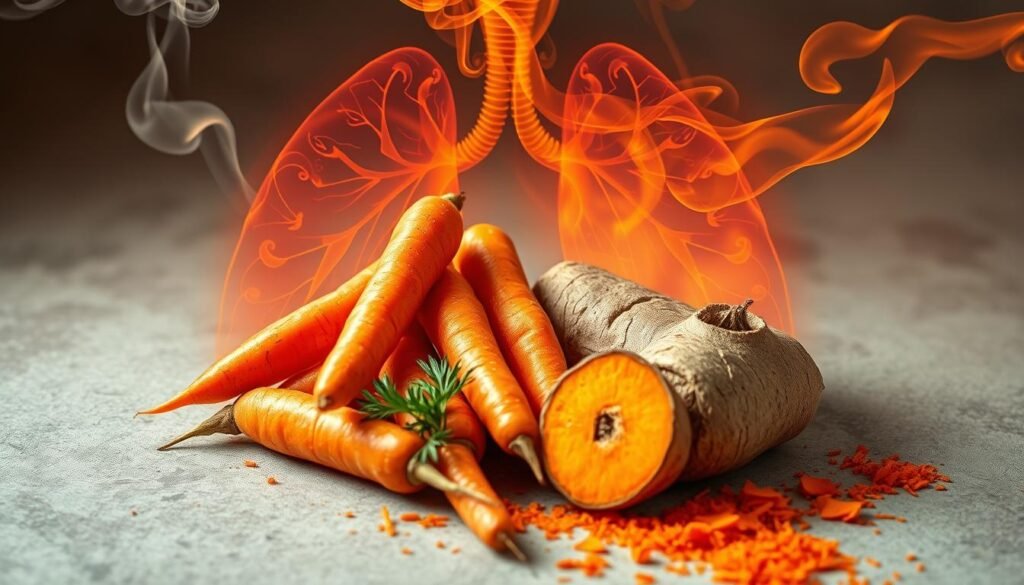Did you know smoking causes about 85% of lung cancer cases? A large study with 29,133 male smokers reported over 1,393 lung cancer diagnoses. This article looks at beta carotene and lung cancer risk in former smokers. Recent research suggests beta carotene supplements might increase health risks. Former smokers should be very careful. Getting antioxidants from foods is better than supplements. To learn more about quitting smoking and lung cancer risks, visit this resource.
Key Takeaways
- Smoking is the leading cause of lung cancer, attributing to 85% of cases.
- Beta carotene supplementation may increase lung cancer risk among former smokers.
- Natural food sources of beta carotene are preferable compared to dietary supplements.
- Fruits and vegetables rich in beta carotene, like carrots and spinach, are beneficial.
- A balanced diet is crucial for health, particularly for those with a history of smoking.
- Consult healthcare professionals when considering dietary supplements.
Introduction to Lung Cancer Risks
Lung cancer is the top cancer diagnosis worldwide, hugely affected by tobacco use. Nearly 12% of global deaths are due to this. In 2015, countries like Russia, India, China, and the USA saw 52% of these deaths. This highlights the strong link between smoking and lung cancer risks.
In 2018, lung cancer caused 18.4% of all cancer deaths. Places like Micronesia/Polynesia and Eastern Europe had high rates among men, at 52.2% and 49.3%. This shows smoking’s role in lung cancer, especially in older men. In fact, in 2017, smoking led to over 76% of lung cancer deaths in men aged 50 and up.
Secondhand smoke also leads to many lung cancer cases. Around 600,000 deaths in 2004 were from secondhand smoke. This shows the importance of fighting all forms of tobacco.
Even those who quit smoking aren’t completely safe from lung cancer. Ex-smokers have higher risks too. It’s important to know how certain vitamins affect lung cancer risk. Awareness and prevention are key in fighting lung cancer caused by smoking and tobacco.
Understanding Beta Carotene and Its Role
Beta carotene is a carotenoid and powerful antioxidant found in colorful fruits and veggies. It turns into vitamin A in our bodies and is famed for promoting lung health. While it was long thought to protect against lung cancer, recent findings urge caution, especially for smokers.
Studies show that high doses of beta carotene could up lung cancer risk in smokers and those around asbestos. The risk jumps from 1.16 to 1.21 for these folks. It seems taking beta carotene as a supplement may not be the same as getting it from food.
In those using supplements, no clear link between the amount and lung cancer risk was found. This suggests that too much could be harmful. It’s a reminder that how we get our nutrients matters.
- About 2.2 million new cases of lung cancer occur annually worldwide.
- Roughly 1.8 million deaths are attributed to lung cancer each year.
- Lung cancer makes up 11.4% of all new cancer cases worldwide.
- The 5-year survival rate for lung cancer is 19%. For non-small-cell lung cancer, it’s slightly better at 25%.
We need to tell apart the beta carotene in foods from that in supplements. With recent studies, it’s become crucial to be careful with beta carotene supplements. This is especially true for people who used to smoke.
For insight on lung cancer’s early signs, explore this resource. It offers thorough information.
| Key Finding | Details |
|---|---|
| New Cases Annually | 2.2 million |
| Annual Deaths | 1.8 million |
| Percentage of Lung Cancer in Neoplasms | 11.4% |
| Median Age at Diagnosis | 70 years |
| 5-Year Survival Rate | 19% (25% for non-small-cell lung cancer) |
The Alpha-Tocopherol, Beta-Carotene Cancer Prevention Study
The Alpha-Tocopherol, Beta-Carotene Cancer Prevention Study was a major test. It looked into how beta carotene affects lung cancer in male smokers. With 29,133 men aged 50 to 69 taking part, the study explored the health effects of beta carotene supplements.
Participants were split into four groups. One group got α-tocopherol, another β-carotene, a third had both, and a fourth received a placebo. This setup helped collect solid data. It shed light on how these supplements could influence lung cancer risk over time.
When the study ended in April 1993, key results were found. 879 men got lung cancer during the research. By 1996, this number hit 1,393. Using certain models, the team looked into the cancer risks these supplements might pose.
| Group | Participants | Lung Cancer Diagnoses (by 1996) |
|---|---|---|
| α-Tocopherol | 7,283 | Approx. 400 |
| β-Carotene | 7,286 | Approx. 450 |
| Both Supplements | 7,276 | Approx. 500 |
| Placebo | 7,288 | Approx. 450 |
This study showed a complex link between antioxidants like beta carotene and lung cancer risk in smokers. It’s a starting point for more research in this crucial health field.
Beta Carotene Lung Cancer Former Smokers: Key Findings
Studies on beta carotene and lung cancer in former smokers show important results about cancer risks and supplements. High doses of beta-carotene seem to increase lung cancer risk in smokers and ex-smokers. This is what various research efforts suggest.

- A study with 29,000 male smokers found an 18% higher lung cancer rate in those taking 20 mg of beta carotene daily for 5 to 8 years.
- An investigation involving 18,000 people with a history of smoking or asbestos exposure saw a 28% increase in lung cancer cases. This was in the group taking 30 mg of beta carotene and 25,000 Units of retinol daily for 4 years.
- However, a study with 22,000 male physicians, including smokers and ex-smokers, showed no rise in lung cancer. This was among those who took 50 mg of beta carotene every other day for 12 years.
The results from these studies tell us to be careful with beta carotene supplements. These are especially for those who used to smoke. Even though beta carotene in foods is safe and may help prevent some cancers and heart disease, supplements are still debated.
Given the risks of high-dose beta-carotene supplements for former smokers, eating a balanced diet is key. For more info on beta carotene and its effects, visit this link.
Impact of Tar and Nicotine Content on Lung Cancer Risk
The link between tar, nicotine in cigarettes, and lung cancer is a big worry for health experts. In 2020, the world saw 22.4 lung cancer cases per 100,000 people. That year, around 2,206,771 new cases were reported.
Smoking is the main cause of lung cancer, leading to 87% of lung cancer deaths in men and 70% in women. Smokers take in lots of tar and nicotine, raising their lung cancer risk. Studies show smokers have a 20 times higher lung cancer risk than nonsmokers.
Understanding how tar and nicotine affect lung cancer is vital. It’s especially important for those thinking about taking beta carotene supplements. Although it might help some, in smokers, it could raise lung cancer risk and death rates.
There’s also a strong call for broad lung cancer screenings. The United States Preventive Services Task Force suggests yearly low-dose CT scans. This is for those 50 to 80 years old who have smoked a lot. It shows how smoking is linked to lung cancer risk.
Research on tar and nicotine’s impact on lung cancer keeps leading to better prevention and public health efforts. Understanding all aspects of lung cancer risk is key to fighting this disease more efficiently.
For the latest insights on lung cancer treatments and how what we eat plays a role, visit here.
Mechanisms Behind Beta Carotene and Lung Carcinogenesis
Beta carotene’s tie to lung carcinogenesis is complicated. It involves mechanisms of lung carcinogenesis connected to oxidative stress and cell changes. Early research hinted that eating more beta carotene might lower lung cancer risk. These early studies showed a possible link between beta carotene intake and reduced lung cancer.
Following studies also saw this link. They found that higher beta carotene levels in the blood often meant a lower chance of lung cancer. But, not all findings agreed.
Some large trials gave us new insights. For example, the Alpha-Tocopherol, Beta-Carotene Cancer Prevention Study showed something worrying. It found that smokers taking beta carotene supplements had more lung cancer. This finding made experts wonder about beta carotene’s negative effects when mixed with cigarette smoke.
Studies involving ferrets showed risks of combining beta carotene with smoke. This mix led to more squamous metaplasia, which is abnormal growth in lung tissue. It also changed protein levels, which could help tumors grow.
But, beta carotene seems less risky for non-smokers or ex-smokers. Those not exposed to asbestos and smoke didn’t see more lung cancer with supplements. This suggests that beta carotene’s dangers might mainly threaten smokers.
Grasping these details is critical. Knowing more about beta carotene and lung cancer can guide diet tips and prevention for those at risk. For more in-depth info, check the research article.
The Role of Antioxidants in Cancer Prevention
Antioxidants are key in the fight against cancer. They help fight free radicals, which can damage cells. This damage is linked to cancer development. So, antioxidants are often discussed in diet conversations.
Beta-carotene’s role in antioxidants is complex, though. Research from the 1990s showed beta-carotene and vitamin A might not prevent lung cancer. They could even increase risk in some people. This has led experts to question the benefits of antioxidant supplements.
A New York University School of Medicine study found an interesting fact. In some lung cancers, tumors can make their own antioxidants. This can help tumors grow and spread.
The Karolinska Institute discovered something worrying, too. Long-term use of antioxidants like N-acetylcysteine and vitamin E might help lung cancer spread in some cases. This suggests that antioxidants might sometimes help cancer cells instead of fighting them.
Health experts suggest getting nutrients from foods, not pills. A diet full of fruits and veggies is better for preventing cancer. It gives you a mix of helpful substances. People getting lung cancer treatment should talk to their doctors about their diet.
To learn more about nutrition and lung cancer, check out this resource.
Nutritional Supplements vs. Dietary Intake of Beta Carotene
It’s important to know how you get your beta carotene. This is especially true for people worried about lung cancer. Getting beta carotene from fruits and veggies is full of benefits without the risks that supplements have. In fact, a fruit and veggie-rich diet might lower lung cancer risk more than supplements do.
Smokers taking a lot of beta carotene supplements face more risks. High supplement amounts can lead to a higher chance of lung cancer. But, eating foods like carrots, sweet potatoes, and leafy greens is safer. Studies show that getting beta carotene from your diet is the better choice for your health.
Eating the right amount of fruits and vegetables gives you more protection. Eating four or more servings a day can lower risks of heart disease and cancer. This way of eating is better for your health and helps you absorb nutrients properly, unlike supplements.

To sum up, supplements may seem like an easy solution, but they don’t offer all the benefits that natural foods do. To reduce lung cancer risks, eat a wide range of fruits and veggies. This choice is safer and more effective than supplements.
| Source of Beta Carotene | Risk of Lung Cancer | Health Benefits |
|---|---|---|
| Nutritional Supplements | Increases risk in smokers | Limited to none |
| Fruits and Vegetables | Lowered risk | Rich in antioxidants and nutrients |
| High-Dose Supplements | Significantly increases risk | Adverse effects possible |
| Balanced Diet | Reduced cancer risk | Overall health improvement |
Clinical Trials and Their Implications
Research on beta carotene and lung cancer is growing. Clinical trials have been focusing on this. They found beta carotene supplements might not be safe for everyone. A big review looked at eight studies with 167,141 people. It found a higher chance of lung cancer from beta carotene supplements.
Some groups have even higher risks. Smokers and those around asbestos faced more danger. Their risk went up more with beta carotene. People not in the medical field also had this increased risk. This shows we need to be careful, especially with certain people.
The amount of beta carotene taken didn’t change the cancer risk. This means no matter the dose, the risk stayed the same. The main takeaway is that beta carotene doesn’t stop lung cancer. It might even make the risk higher.
| Study Population | Relative Risk (RR) | Confidence Interval (CI) |
|---|---|---|
| General Participants | 1.16 | (1.06–1.26) |
| Smokers/Asbestos Workers | 1.21 | (1.08–1.35) |
| Non-Medical Individuals | 1.18 | (1.07–1.29) |
Guidelines for Former Smokers Regarding Beta Carotene
If you’ve quit smoking, adding beta carotene to your diet is a smart move. But, be careful. Taking beta carotene in high doses isn’t recommended due to possible risks. The best advice for former smokers is to get beta carotene from foods. Eat carrots, sweet potatoes, and spinach for this nutrient. These foods are not only rich in beta carotene but also have vitamins and minerals that are good for your health.
Experts advise a diet full of antioxidants for those who’ve stopped smoking. This kind of diet helps fight off oxidative stress, something smokers often face more. Important nutrients for lung health include vitamins A, C, E, zinc, and magnesium. Focusing on these can make a big difference in protecting your lungs.
A balanced diet with natural beta carotene and other antioxidants is key for ex-smokers. It’s all about improving your health while keeping an eye on important nutrients. This approach lays a solid foundation for staying well in the long run.

Conclusion
Digging into beta carotene and its link to lung cancer risk in former smokers unveils key findings. These insights are vital for crafting future health strategies. Current research shows a clear link between taking beta carotene supplements and a higher chance of getting lung cancer.
People who have stopped smoking should think twice before taking beta carotene supplements due to these risks. Instead of supplements, eating foods high in beta carotene might be a safer bet. Carrots, sweet potatoes, and leafy greens are good sources.
This way, former smokers can better protect their health and lower their cancer risk. Choosing what to eat wisely is crucial for a healthier tomorrow. This battle against lung cancer continues, but smart dietary choices can make a big difference.
In summary, it’s key to understand how beta carotene affects lung cancer risk. For people quitting smoking, this knowledge is crucial for cancer prevention. Staying up-to-date on research about diet and supplements is important for their health journey.